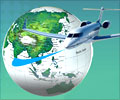It built its economy on ships, steel and semiconductors but now South Korea is pushing a new growth engine -- a major share of the world's booming medical tourism market.
It built its economy on ships, steel and semiconductors but now South Korea is pushing a new growth engine, a major share of the world's booming medical tourism market.
The government's goal is one million foreign patients a year by 2020 and hospitals have launched aggressive marketing campaigns since they were allowed to advertise for foreign patients under a law that took effect last year."Today demand for medical services is higher than ever and medical tourism is growing rapidly," Vice Knowledge Economy Minister Kim Young-Hak told the opening of a three-day medical tourism expo recently.
The event, organised by the Korea Global Healthcare Association, which links hospitals, clinics and state agencies, drew about 5,600 visitors including nearly 300 foreigners.
The association, which has 750 members, said foreign buyers reached deals worth 32 million dollars with hospitals that took part.
"Our medical tourism is growing fast. We can easily catch up with Singapore and other Asian countries," association chief Park In-Chool told AFP. Just under 350,000 people visited Singapore for treatment in 2007, according to official figures.
Park said he expected South Korea's final figures for 2009 would show some 50,000 foreigners had visited for treatment compared to 27,400 a year before.
Advertisement
"Competition is already tough among Asian countries. Our government must move quickly to ease regulations and help our medical industry catch up with Asian rivals."
Advertisement
Bumrungrad Hospital, one of the biggest private hospitals in Bangkok, said it treated around 430,000 foreign patients a year, from countries including the United States, Japan, Oman and Australia.
South Korea is in a good position given its high medical standards, according to L. Casey Chosewood, a director of the US Centers for Disease Control and Prevention, who attended a seminar arranged by the Korea Global Healthcare Association.
"I think South Korea has a considerable advantage over many other countries. It's a very developed country and it already has a very safe healthcare industry."
Scott Edelstein, a healthcare counsellor from US-based law firm Squire, Sanders and Dempsey, forecast that the value of global medical tourism would rise to 100 billion dollars in 2012 from 60 billion dollars in 2006.
Many Americans visit Latin America because of its proximity but South Korea and other Asian countries are gaining popularity, he said.
"It's not for lower costs but it's for quicker access to high quality care. I'm very optimistic about the growth of medical tourism in Korea," Edelstein said.
South Korea opened centres in August to give medical tourists a one-stop service and is training coordinators to help foreigners find the care they want.
The language barrier is the biggest hurdle, experts say.
"You are not able to communicate to American patients about possibilities available here," said Woody Anderson, head of US-based public relations agency EMMI Korea.
South Korea, which is known for its high success rate in treatment of cancers and liver transplants, needed to advertise more and offer tour packages that appealed to prospective patients, he said.
"I think that Korea, if they can communicate to the rest of the world about their facilities, would be a lead country in Asia," Anderson said.
"One opportunity for smaller clinics and hospitals here is the area of oriental medicine because that's an area Americans are very enthusiastic about. China has faith in oriental medicine but Korea has science."
Along with its strength in traditional Asian medicine, South Korea is considered competitive in plastic surgery, dental care and ophthalmology, according to a 2008 government survey.
Vice-minister Kim said the cost of medical services in South Korea was around 30 percent of the price of treatment in the United States and around 60 percent of that in Japan, but the industry lacked recognition overseas.
Doctors want better promotion abroad, standardisation of services and systematic government support.
"Publicity and infrastructure are not sufficient," said Lee Dae-Yong, an international affairs official at Seoul's Yonsei University hospital. "We also need effective guidelines to solve legal problems."
Park, the head of the Korea Global Healthcare Association, was optimistic about the pace of change.
"Our short-term goal is to become a leader in Asia's medical tourism industry," he said, predicting South Korea and China would eventually lead Asia's healthcare market. "We've just made a start."
Source-AFP
SRM









